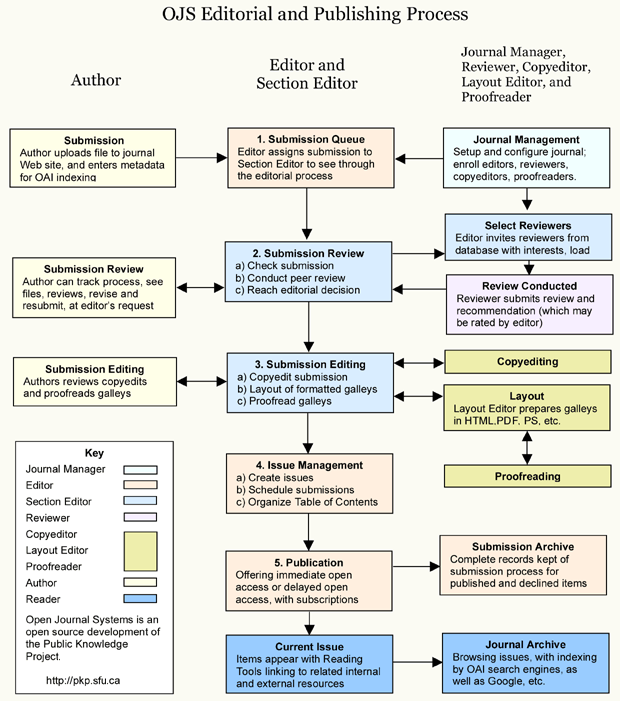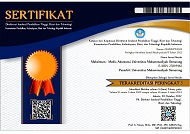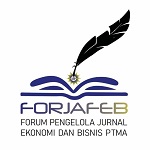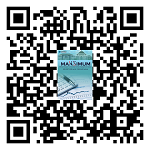- Focus and Scope
- Section Policies
- Peer Review Process
- Publication Frequency
- Open Access Policy
- Archiving
- Article Processing Charge
- Publication Ethics Statement
- Anti-Plagiarism Policy
- Withdrawal of Manuscripts
- Journal Scientific Statement
- Indexing
- Licensing Terms
- Pemesanan MAKSIMUM Cetak
- About this Publishing System
- Review Guidelines
Focus and Scope
The manuscript was written for Maksimum: Media Akuntansi Universitas Muhammadiyah Semarang. It should be an original research paper, either theoretically or empirically, that sufficiently contributes novelty to the accounting literature. This journal provides immediate access to its content on the principle that making research freely available to the public supports a greater global knowledge exchange. Maksimum is published by Accounting Department, Faculty of Economics and Business, Muhammadiyah University of Semarang and Supported by IAI-KAPd (Ikatan Akuntan Indonesia - Kompartemen Akuntan Pendidik). It covers the following topics:
- Financial Accounting and Reporting
- Corporate Social Responsibility, Sustainability and Green Accounting
- Managerial and Cost Accounting
- Performance Management and Measurement
- Sharia Accounting
- Public Accounting
- Public Investment and Procurement
- Auditing
- Taxation (Accounting and Compliance)
- Accounting Information System
- Investment Analysis and Management
- Capital Markets Analysis
- Behavioral in Investment and Finance
- Sustainability Investment
- Banking
- Intellectual Capital
- Good Governance Issues
- Fraud Mitigation
- Whistleblowing
Section Policies
Articles
Peer Review Process
This journal provides immediate open access to its content on the principle that making research freely available to the public supports a greater global exchange of knowledge.
Publication Frequency
Maksimum: Media Akuntansi Universitas Muhammadiyah Semarang publishes a new issue every March and September.
Open Access Policy
This journal provides immediate access to its content on the principle that making research freely available to the public supports a greater global knowledge exchange.
This open-access journal means that all content is freely available without charge to users or / institutions (for online version only). Users or people are allowed to read, download, copy, distribute, print, search, or link to full-text articles in this journal without asking prior permission from the publisher or author. Hence, there is no subscription fee to access the online version of MAKSIMUM articles. However, people who want to get a MAKSIMUM hardcopy should buy it by following an inevitable process (click here to order a MAKSIMUM hardcopy).

Archiving
This journal utilizes the LOCKSS system to create a distributed archiving system among participating libraries and permits those libraries to create permanent archives of the journal for purposes of preservation and restoration. More...
Jurnal ini menggunakan sistem LOCKSS untuk menciptakan sistem pengarsipan terdistribusi di antara perpustakaan yang berpartisipasi dan memungkinkan perpustakaan tersebut untuk membuat arsip permanen jurnal untuk tujuan pelestarian dan pemulihan.Lebih lanjut...
Article Processing Charge
All accepted manuscripts are subject to "Article Processing Charges" (APC) to provide free access to readers and cover the costs of peer review management, journal production, online hosting, and long-term archiving. This APC is valid for the current calendar year and may be changed at any time at the publisher's discretion. The submitting author is responsible for payment of the APC and must confirm, at the time of submission, that he/she/they would organize payment of the APC, should the article be accepted for publication. This responsibility may not be delegated to any third party unless agreed to by the publisher. Be noted that APC will be billed only after the article "Accepted" and will not affect the peer review process. APC that is applied by Maksimum: Media Akuntansi Universitas Muhammadiyah Semarang as the following:
- The cost of article submission IDR 0,-
- Processing Fees for the publication of accepted article is IDR 700,000.-
Publication Ethics Statement
Our ethical statements are based on COPE’s Best Practice Guidelines for Journal Editors.
Statement
Maksimum: Media Akuntansi Universitas Muhammadiyah Semarang is a peer-reviewed and open-access journal published by Universitas Muhammadiyah Semarang in collaboration with The Association of Accounting Department of Muhammadiyah Higher Education Institutions (APSA PTM), The Forum of Economics and Business Journal Managers of Muhammadiyah and Aisyiyah Higher Education Institutions (FORJAFEB PTMA), and the Institute of Indonesia Chartered Accountant that committed to upholding the highest standards of publication ethics and takes all possible measures against publication malpractice. This statement clarifies the ethical behaviour of all parties involved in the act of publishing an article in this journal, including the author, editor, editorial board, reviewer, and publisher. This statement is based on COPE’s Best Practice Guidelines for Journal Editors. Our responsibility is to publish original work of value to the intellectual community in the best possible form and to the highest possible standards. We expect similar standards from our reviewers and authors. Honesty, originality, fair dealing on the part of authors, as well as fairness, objectivity, and confidentiality on the part of editors and reviewers, are among the critical values that enable us to achieve our goal. Journal of Accounting and Investment is committed to following best practices on ethical matters, errors, and retractions and to provide a legal review if necessary.
Duties of Editors
Publication Decisions
The editors of the Journal of Accounting and Investment ensure that all submitted manuscripts being considered for publication undergo peer review by at least two reviewers who are experts in the field. The editor is responsible for deciding which of the manuscripts submitted to the journal will be published based on the validation of the work in question, its importance to researchers and readers, the reviewers’ comments, and such legal requirements as are currently in force regarding libel, copyright infringement and plagiarism. The editor may confer with other editors or reviewers to make this decision.
Fair Play
Editors evaluate submitted manuscripts exclusively based on their academic merit (importance, originality, study’s validity, clarity) and their relevance to the journal’s scope, without regard to the author’s race, gender, sexual orientation, ethnic origin, citizenship, religious belief, political philosophy or institutional affiliation. The policies of governments or other agencies outside the journal itself do not determine decisions to edit and publish. The editor-in-chief has full authority over the entire editorial content of the journal and the timing of publication of that content.
Confidentiality
The editors and any editorial staff must not disclose any information about a submitted manuscript to anyone other than the corresponding author, reviewers, potential reviewers, other editorial advisers, and the publisher, as appropriate.
Disclosure and conflicts of interest
The Editors will not use unpublished information disclosed in a submitted manuscript for research purposes without the author’s explicit written consent. Privileged information or ideas obtained by editors while handling the manuscript will be kept confidential and not used for their advantage. Editors will recuse themselves from considering manuscripts in which they have conflicts of interest resulting from competitive, collaborative, or other relationships/connections with any of the authors, companies or institutions connected to the papers; instead, they will ask another editorial board member to handle the manuscript.
Management of unethical behaviour(s)
The editors and the publisher(s) should take rationally responsive measures when ethical complaints have been presented regarding a submitted manuscript or published article. Every reported act of unethical publishing behaviour will be looked into, even if it is discovered years after publication. For this reason, Journal of Accounting and Investment has legal experts in the field of Intellectual Property rights established by Universitas Muhammadiyah Semarang.
Duties of Authors
Reporting Standards
Authors of original research should present an accurate account of the work performed and the results, followed by an objective discussion of the significance of the work. The manuscript should contain sufficient detail and references to permit others to replicate the work. Review articles should be accurate, objective and comprehensive, while editorial ‘opinion’ or perspective pieces should be identified as such. Fraudulent or knowingly inaccurate statements constitute unethical behaviour and are unacceptable.
Data access and retention
Authors are asked to provide the raw data in connection with a paper for editorial review. They should be prepared to provide public access and, in any event, be prepared to retain such data for a reasonable time after publication.
Originality and plagiarism
The authors should ensure that they have written entirely original works, and if the authors have used the work and/or words of others, that this has been appropriately cited or quoted. Plagiarism takes many forms, from 'passing off' another's paper as the author's paper, to copying or paraphrasing substantial parts of another's paper (without attribution), to claiming results from research conducted by others. Plagiarism in all its forms constitutes unethical publishing behaviour and is unacceptable. We will check each manuscript using a plagiarism checker (Turnitin) to ensure the originality of the article. Furthermore, each submitted article should be accompanied by a letter of statement from the author(s) stating that the article is free from plagiarism.
Multiple, redundant or concurrent publication
Papers describing the same research should not be published in multiple journals or primary publications. Hence, authors should not submit a manuscript already published in another journal for consideration. Submission of a manuscript concurrently to more than one journal is unethical publishing behaviour and unacceptable.
Acknowledgement of sources
Authors should ensure that they have properly acknowledged the work of others and cite publications that have been influential in determining the nature of the reported work. Information obtained privately (from the conversation, correspondence or discussion with third parties) must not be used or reported without explicit, written permission from the source. Authors should not use information obtained while providing confidential services, such as refereeing manuscripts or grant applications, unless they have obtained the explicit written permission of the author(s) of the work involved in these services.
Authorship of the paper
Authorship should be limited to those who have contributed significantly to the conception, design, execution, or interpretation of the reported study. All those who have made significant contributions should be listed as co-authors. Where others have participated in certain substantive aspects of the research project, they should be acknowledged or listed as contributors. The corresponding author should ensure that all co-authors have seen and approved the final version of the paper and have agreed to its submission for publication.
Fundamental errors in published works
When an author discovers a significant error or inaccuracy in his/her published work, the author must promptly notify the journal editor or publisher and cooperate with the editor to retract or correct the paper. If the editor or the publisher learns from a third party that a published work contains a significant error, the author must promptly retract or correct the paper or provide evidence to the editor of the correctness of the original paper.
Hazards and human subjects
If the work involves chemicals, procedures, or equipment with any unusual hazards inherent in their use, the author must identify these in the manuscript. If the work consists of the use of human subjects, the author should ensure that the manuscript contains a statement that all procedures were performed in compliance with relevant laws and institutional guidelines and that the appropriate institutional committee(s) has approved them. The authors should include a statement in the manuscript that informed consent was obtained for experimentation with human subjects. The privacy rights of human subjects must always be observed.
For human subjects, the author should ensure that the work described has been carried out following The Code of Ethics of the World Medical Association (Declaration of Helsinki) for experiments involving humans.
Declaration of competing interests
All authors should disclose in their manuscript any financial and personal relationships with other people or organizations that could be viewed as inappropriately influencing (bias) their work. All sources of financial support for the conduct of the research and/or preparation of the article should be disclosed, as should the role of the sponsor(s), if any, in study design; in the collection, analysis and interpretation of data; in the writing of the report; and in the decision to submit the article for publication. If the funding source(s) had no such involvement, this should be stated. The author must declare competing interests in the manuscript/paper template.
Image Integrity
Enhancing, obscuring, moving, removing, or introducing a specific feature within an image is unacceptable. Adjustments of brightness, contrast, or colour balance are acceptable if and as long as they do not obscure or eliminate any information present in the original. Manipulating images for improved clarity is accepted, but manipulation for other purposes could be seen as scientific ethical abuse and will be dealt with accordingly. Authors should comply with any specific policy for graphical images applied by the relevant journal, e.g. providing the original images as supplementary material with the article or depositing these in a suitable repository.
Duties of Peer Reviewers
Contribution to Editorial Decisions
Peer review assists the editor in making editorial decisions and, through the editorial communications with the author, may also assist the author in improving the paper.
Promptness
Any selected referee who feels unqualified to review the research reported in a manuscript or knows its prompt review will be impossible should notify the editor and excuse himself from the review process.
Confidentiality
Any manuscripts received for review must be treated as confidential documents. They must not be shown to or discussed with others except as authorized by the editor.
Standards of Objectivity
Reviews should be conducted objectively. Personal criticism of the author is inappropriate. Referees should express their views clearly with supporting arguments.
Acknowledgement of sources
Reviewers should identify relevant published work that the authors have not cited. Any statement that an observation, derivation, or argument had been previously reported should be accompanied by the relevant citation. A reviewer should also call to the editor's attention any substantial similarity or overlap between the manuscript under consideration and any other published paper they have personal knowledge.
Disclosure and Conflict of Interest
Privileged information or ideas obtained through peer review must be kept confidential and not used for personal advantage. Reviewers should not consider manuscripts with conflicts of interest resulting from competitive, collaborative, or other relationships or connections with any of the authors, companies, or institutions connected to the papers.
Anti-Plagiarism Policy
Papers submitted to MAKSIMUM: Media Akuntansi Universitas Muhammadiyah Semarang will be screened for plagiarism using Turnitin plagiarism detection tools. MAKSIMUM will immediately reject papers leading to plagiarism or self-plagiarism.
Before submitting articles to reviewers, a member of the editorial team first checks them for similarity/plagiarism using a tool. The papers submitted to MAKSIMUM must have a similarity level of less than 20%.
Plagiarism is exposing another person’s thoughts or words as though they were your own, without permission, credit, or acknowledgement, or because of failing to cite the sources properly. Plagiarism can take diverse forms, from literal copying to paraphrasing the work of another. To properly judge whether an author has plagiarized, we emphasize the following possible situations:
- An author can literally copy another author’s work- by copying word by word, in whole or in part, without permission, acknowledge or citing the source. This practice can be identified by comparing the source and the manuscript/work suspected of plagiarism.
- Substantial copying implies that an author reproduces a substantial part of another author without permission, acknowledgement, or citation. The term can be understood in terms of quality and quantity, and it is often used in the context of Intellectual property. Quality refers to the relative value of the copied text in proportion to the work as a whole.
- Paraphrasing involves taking ideas, words, or phrases from a source and crafting them into new sentences within the writing. This practice becomes unethical when the author does not properly cite or acknowledge the original work/author. This form of plagiarism is the more difficult to identify.
Withdrawal of Manuscripts
General Policy of Article Withdrawal
It is a general principle of scholarly communication that the journal editor is solely and independently responsible for deciding which articles submitted to the journal shall be published. In making this decision, the editor is guided by the policies of the journal's editorial board and constrained by such legal requirements in force regarding libel, copyright infringement, and plagiarism. An outcome of this principle is the importance of the scholarly archive as a permanent, historical record of the transactions of scholarship. Articles that have been published shall remain extant, exact, and unaltered as far as is possible. However, occasionally, circumstances may arise where an article is published that must later be retracted or removed. Such actions must not be undertaken lightly and can only occur under exceptional circumstances. In addition, the Author(s) (and/or their institution) will be punished for any article withdrawal in the form of an article submission ban (temporary up to permanent ban)
This policy has been designed to address these concerns and consider current best practices in the scholarly and library communities. As standards evolve and change, we will revisit this issue and welcome the input of academic and library communities. We believe these issues require international standards. All of the Article Withdrawal Policies in MAKSIMUM (including Withdrawal of Manuscripts, Article in Press, Article Retraction, Article Removal, and Article Replacement Policies) are adopted from Elsevier Article Withdrawal Policy.
Article Withdrawal by Author(s)
Author(s) are not allowed to withdraw an article that has been sent to MAKSIMUM because the withdrawal of the article wastes the resources, time, and effort that the Editor and peer reviewers do in processing the article. If the author still requests the withdrawal of the article, the author will be punished by a ban on submitting a manuscript for (maximum) 6 numbers (3 volumes or 3 years) for the manuscript withdrawal in the review process. However, withdrawing a manuscript from a journal is highly unethical because another journal has accepted it.
The withdrawal of the article after the manuscript has been accepted for publication is highly unethical. The author will be punished by being banned from submitting a manuscript for (maximum) 20 numbers (10 or 10 years). Withdrawal of the manuscript in this policy includes submitting article revisions that exceed the time limit specified by the Editor and does not immediately notify the Editor and/or revise the manuscript. If the author does not modify the manuscript by the deadline without any confirmation, the Author can be banned for (maximum) 12 numbers (6 volumes or 6 years).
Authors who make more than one manuscript withdrawal can be banned permanently. This banning may also be applied to the author’s institution. The MAKSIMUM Editorial Board can publicly announce through the MAKSIMUM page and/or provide information to other journal editors or other publishers when the MAKSIMUM Editorial Board is performing the banning processes in these cases.
Journal Scientific Statement
The articles published in MAKSIMUM: Media Akuntansi Universitas Muhammadiyah Semarang are scientifically proved the following the ethics code of scientific publication. The ethics code itself upholds three values of ethics in publications, namely, (1) Neutrality (free from conflicts of interest in the management of publications); (2) Justice (giving the right of authorship to the beneficiary as the author); and (3) Honesty (free from duplication, fabrication, falsification and plagiarism) in the publication. The articles published also follow the certain procedures or orders, such as double blind review and revision process that consistent with the journal’s regular review, to ensure that the quality is maintained properly.
Indexing
MAKSIMUM: Media Akuntansi Universitas Muhammadiyah Semarang, with registered number e-ISSN: 2580-9482, ISSN: 2087-2836. Finally, accepted papers will be freely accessed in this website and the following abstracting & indexing databases:
- GOOGLE Scholar
- GARUDA: Garba Rujukan Digital
- CrossRef Search
- Lembaga Ilmu Pengetahuan Indonesia
- BASE Bielefeld search engine
- Indonesia OneSearch
- Academic Resource Index
- Dimension
- Neliti
- PKP Index
- Moraref
- SINTA 3
Licensing Terms
Authors who publish with MAKSIMUM: Media Akuntansi Universitas Muhammadiyah Semarang agree to the following terms :
- Authors retain copyright and grant the MAKSIMUM: Media Akuntansi Universitas Muhammadiyah Semarang right of first publication with the work simultaneously licensed under a Creative Commons Attribution Attribution-NonCommercial-NoDerivatives 4.0 International License that allows others to share (copy and redistribute the material in any medium or format) and adapt (remix, transform, and build upon the material) the work for any purpose, even commercially with an acknowledgement of the work's authorship and initial publication in MAKSIMUM: Media Akuntansi Universitas Muhammadiyah Semarang.
- Authors can enter into separate, additional contractual arrangements for the non-exclusive distribution of the journal's published version of the work (e.g., posting it to an institutional repository or publishing it in a book), with an acknowledgement of its initial publication in MAKSIMUM: Media Akuntansi Universitas Muhammadiyah Semarang.
- Authors are permitted and encouraged to post their work online (e.g., in institutional repositories or on their website) prior to and during the submission process, as this can lead to productive exchanges and earlier and greater citation of published work (See The Effect of Open Access).
Pemesanan MAKSIMUM Cetak
Mulai Volume 11, MAKSIMUM: Media Akuntansi Universitas Muhammadiyah Semarang (MAKSIMUM, e-ISSN: 2580-9482, p-ISSN: 2087-2836) menyediakan edisi cetak dengan kualitas kertas glossy (CTS). MAKSIMUM terbit 2 nomor (edisi) pertahun. Harga tiap eksemplar MAKSIMUM adalah Rp. 130.000 (belum termasuk biaya pengiriman, per Maret 2021):
About this Publishing System

Review Guidelines
Guidelines for Reviewers
Responsibility of Peer Reviewer
Peer reviewers are responsible for critiquing by reading and evaluating manuscripts in their field of expertise, then giving constructive advice and honest feedback to the author of the article submitted. Peer reviewers discuss the article's strengths and weaknesses, how to increase the strength and quality of the paper, and evaluate the relevance and authenticity of the manuscript.
Before reviewing, please note the following:
- Is the article requested to be reviewed in accordance with your expertise? If you receive a script that covers topics that are not appropriate areas of your expertise, please notify the editor as soon as possible. Please recommend an alternative reviewer.
- Do you have the time to review this paper? The review process must be completed within two weeks. If you agree and require a more extended period, notify the editor as soon as possible, or suggest an alternative reviewer.
- Is there any potential conflict of interest? Meanwhile, conflicts of interest will not disqualify you as a reviewer, disclose all conflicts of interest to the editor before reviewing. If you have any questions about potential conflicts of interest, do not hesitate to contact the editorial office.
When reviewing the article, please consider the following:
- Title: Does it clearly illustrate the article?
- Abstract: does it reflect the contents of the article?
- Introduction: Does it describe the accuracy of matters submitted by the author and clearly state the problem being considered? Typically, the introduction should summarize the context of the relevant research and explain the findings of the research or other findings, if any, offered for discussion. This research should explain the experiments, hypotheses, and methods.
Content of the Article
To determine the originality and suitability of the journal, are there any elements of plagiarism in over 5% of this paper field? A quick literature search can use specific tools such as Scopus to see if there are similarities from other parts.
- If other authors had previously done the study, would it still be eligible for publication?
- is the article relatively new, reasonably deep, and fascinating to be published?
- does it contribute to knowledge?
- Does the article adhere to the journal's standards?
- Scope - Is the article in line with the objectives and scope of the journal?
Method
Comprehensive and perfect:
- does the author accurately describe how the data is collected?
- is the theoretical basis or reference used appropriate for this study?
- Is the exposure design suitable for answering the question?
- Is there enough information for you to imitate the research?
- does the article identify the following procedures?
- are there any new methods? If there is a new method, does the author explain it in detail?
- is there any appropriate sampling?
- have the tools and materials used been adequately explained? and
- does the article exposure describe what type of data is recorded, right in describing the measurement?
Results:
This is where the author must explain the findings of his/her research. It should be laid out and in a logical sequence. You must consider whether the appropriate analysis has been carried out, including statistical tools. If you have better statistical tools to use in this study, notify it; the interpretation need not be included in this section.
Discussion and Conclusion:
- Do fair results and reasonable support the claims in this section?
- Does the author compare the research results with those of other previous studies?
- Do the research results in the article contradict the previous theories?
- Does the conclusion explain how better scientific research should be followed up on?
Tables and Pictures:
Is it suitable with the referred explanation by showing data which is easy to interpret and understandable for the readers?
Writing Styles
- Authors must be critical, mostly of the literature and systematic reviews of issues relevant to the field of study.
- Reviews should be focused on a single topic.
- All exposure should be in English and written in good and coherent grammar.
- Easy to understand
- Interesting to read
Things that need to be considered:
- Perspective, a unique perspective that describes experiences and situations related to issues in marketing management, finance management, strategic management, operation management, human resource management, e-business, knowledge management, management accounting, management control system, management information system, international business, business economics, business ethics and sustainable, and entrepreneurship.
Originality Research
- The original data and testing must present data that offers a new approach to improving systems, processes, and the precision of the tools used.
- Research policy and observational analysis should clarify the research results' feasibility, effectiveness, and implementation. It is not limited to the topics of marketing management, finance management, strategic management, operation management, human resource management, e-business, knowledge management, management accounting, management control systems, management information systems, international business, business economics, business ethics and sustainability, and entrepreneurship.
- In Practice (case study), The paper should explain the situation regarding the future challenges in marketing management, finance management, strategic management, operation management, human resource management, e-business, knowledge management, management accounting, management control system, management information system, international business, business economics, business ethics and suistainable, and entrepreneurship, within its conclusions, and things which can be learned.
Reference
- First Person (Interview)
- Book Reviews
- Insight Technology (Product Review)
Final Review
- All results of the review submitted by reviewers are confidential
- If you want to discuss the article with a colleague, kindly inform the editor
- Do not contact the author directly.
- Ethical issues:
- Plagiarism: if you suspect the article is mostly plagiarism from other authors, please let the editor know the details
- Fraud: It is challenging to detect a fraud category, but if you suspect the results in the article are not true, please inform the editor
Please complete "The Review" by the due date to the editorial office. Your recommendation for the article will be considered when the editor makes a final decision, and your honest feedback is highly appreciated.
When you write a comment, please show the part of the comment that is only intended for the editor and parts that can be returned to the author.
Please do not hesitate to contact the editorial office with any questions or problems that you may encounter.


















